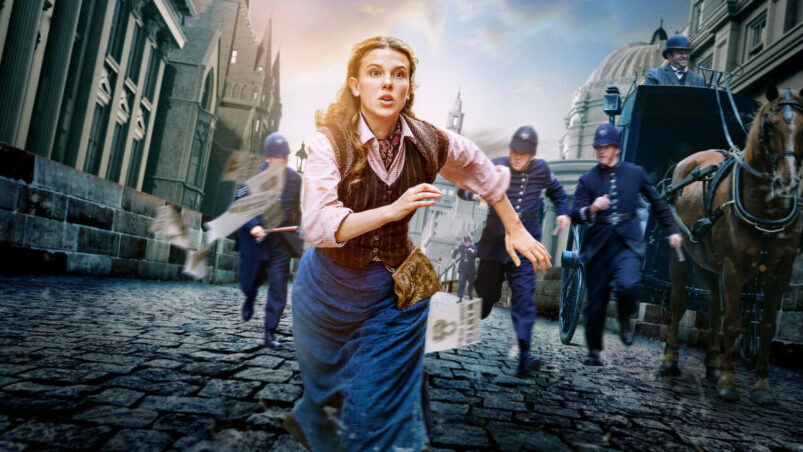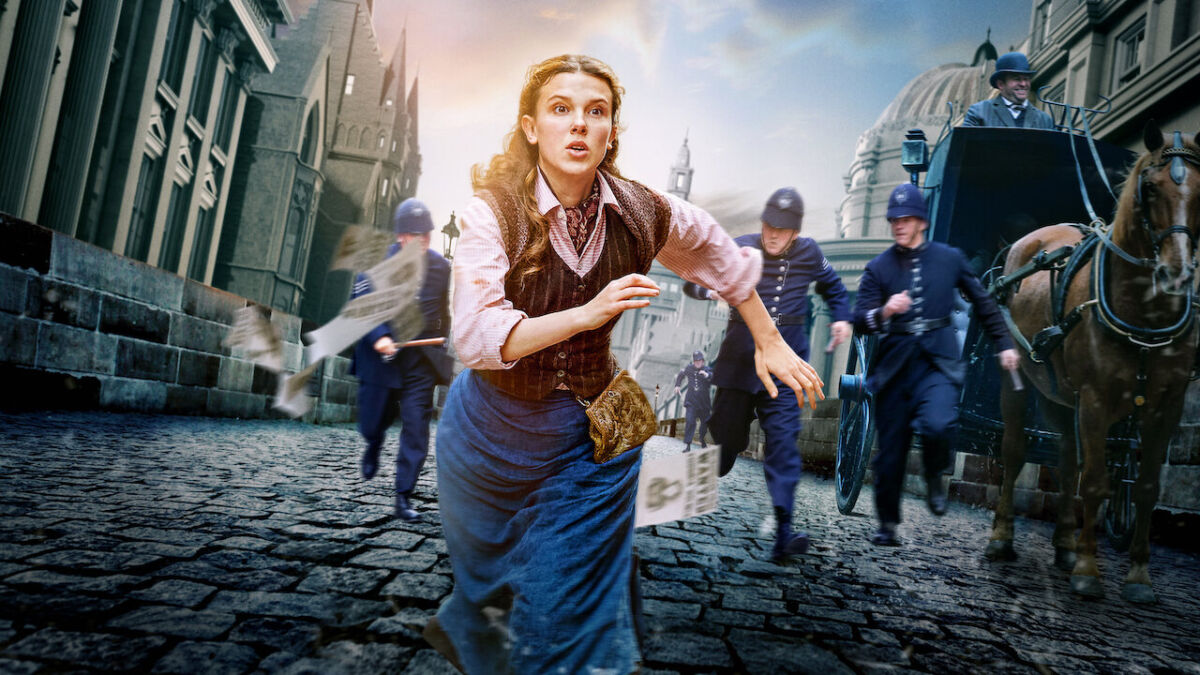I enjoyed the first Enola Holmes movie. While the story elements and mystery weren’t exactly the most compelling, what made it work was the sheer star power of Millie Bobby Brown, and a whole host of characters that helped carry the narrative. It’s rare that a sequel bests the first, but I have to say I enjoyed the sequel so much more. The case will likely hook most viewers, as you’ll get swept up in the entire sleuthing game with much delight.
We begin the movie with Enola Holmes (Brown) setting up her own detective agency, only things aren’t as easy as she thought they would be. All her potential clients sneer at the fact that she’s a woman, and being the sister of the famous Sherlock Holmes (Henry Cavill) doesn’t help. Just as she’s given up, a prospective client shows up. The young Bessie (Serrana Su-Ling Bliss) found an advertisement for her business on the streets, and wants Enola to find her sister Sarah, who’s gone missing.
What starts as a simple missing persons case weaves itself into a more tangled web, one that also involves Sherlock and the case he’s investigating. The more Enola investigates, the more she realises that independence and agency doesn’t mean you can’t accept support from others. I think this is the most important aspect of the movie. Enola receives help from her mother (Helena Bonham Carter), Edith (Susan Wokoma), Tewkesbury (Louis Partridge) and even Sherlock, whose inclusion feels more organic this time around. Initially, she spurns help, believing that collaboration will take away from her efforts, but comes to realise that you don’t have to be alone to be independent. As much as there are terrifying male villains in this movie, such as David Thewlis’ Grail, there are also men who are allies, fighting beside women for their causes.
Brown is so charming and effervescent in the role. She conveys Enola’s spirited demeanour with gusto, but also manages to flesh out her vulnerabilities, especially when it comes to Tewkesbury. The spark and chemistry between Brown and Partridge from the previous film is still present here, and their relationship develops in an organic way. And even though Sherlock and Tewkesbury are supporting characters, they still have proper arcs and character development. Even Bessie has her own space in the movie, and isn’t merely used as a plot device to move things along.
The action scenes are well-choreographed, giving us proper tension and stakes. Even though we know Enola will end the film mostly unscathed, the movie never makes things easy for her. Grail is a force to be reckoned with, and he doesn’t care who he has to kill in order to get what he wants. Thewlis brings a proper menace to the role, and even though most of us know him as Remus Lupin from the Harry Potter franchise, I will always remember him for his chilling depiction as Einon in the movie Dragonheart.
There’s a host of great performances in this. Carter always delights, and Cavill brings a certain gravitas to his portrayal of the famous detective. But the true standout here is Sharon Duncan-Brewster as Mira Troy, and I’m excited to see what they craft for her in future installments.
Director Harry Bradbeer, who directed the first Enola Holmes movie as well, has done a fantastic job of immersing us in this world and its characters. The competency of these two movies isn’t surprising given his involvement in shows like Fleabag and Killing Eve. I’m optimistic that the same quality will carry into the next movie, and I simply can’t wait to see what Enola gets up to next.
READ NEXT: 15 Best Action Movies On Netflix You Should Watch
Some of the coverage you find on Cultured Vultures contains affiliate links, which provide us with small commissions based on purchases made from visiting our site.


